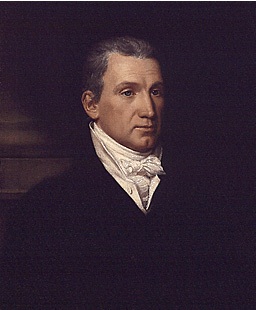Monroe Doctrine: Difference between revisions
I did not change anything but added a line about Acts of Aggresstion |
Jim.henderson (talk | changes) m Reverted edits by 136.228.35.31 (talk) to last version by 148.252.128.173 Tag: Rollback |
||
| (45 intermediate revisions by 35 users not shown) | |||
| Line 1: | Line 1: | ||
{{ |
{{multiple image|direction=vertical|image1=jamesmonroe-npgallery.jpg|image2=John Quincy Adams.jpeg|width=210|caption1=[[U.S. President]] [[James Monroe]].|caption2=[[Secretary of State]] [[John Quincy Adams]], the author of the Monroe Doctrine.}} |
||
The '''Monroe Doctrine''' was a [[foreign policy of the United States]] that was proclaimed in 1823 during the presidency of [[President of the United States|US President]] [[James Monroe]] but had been the idea of [[Secretary of State]] [[John Quincy Adams]]. It stated that no [[Europe|European]] power could [[colonialism|colonize]] any more of the [[Americas]] or of the [[Western Hemisphere]] in general. |
|||
==Related pages== |
|||
In particular, most of the [[Spanish Empire]] in [[South America]] had recently become independent because of the [[Napoleonic Wars]] against [[France]]. Having won the [[Peninsular War]], [[Spain]] wanted its empire back, which the Monroe Doctrine stated that the [[United States]] would resist. The [[United Kingdom]] agreed because it wanted to trade with the newly-independent countries and so it helped enforce the Monroe Doctrine by its powerful [[Royal Navy]]. |
|||
* [[NATO]] |
|||
* [[European Union]] |
|||
* [[Berlin Wall]] |
|||
* [[Ronald Reagan]] |
|||
* [[Mikhail Gorbachev]] |
|||
* [[Falklands War]] |
|||
* [[Diplomacy]] |
|||
* [[United States Department of State]] |
|||
* [[Cuba]] |
|||
* [[Cuban Missile Crisis]] |
|||
{{multistub|history|politics|US}} |
{{multistub|history|politics|US}} |
||
{{DEFAULTSORT:Monroe Doctrine}} |
{{DEFAULTSORT:Monroe Doctrine}} |
||
[[Category:1823]] |
[[Category:1823]] |
||
Latest revision as of 16:12, 14 February 2024
The Monroe Doctrine was a foreign policy of the United States that was proclaimed in 1823 during the presidency of US President James Monroe but had been the idea of Secretary of State John Quincy Adams. It stated that no European power could colonize any more of the Americas or of the Western Hemisphere in general.
In particular, most of the Spanish Empire in South America had recently become independent because of the Napoleonic Wars against France. Having won the Peninsular War, Spain wanted its empire back, which the Monroe Doctrine stated that the United States would resist. The United Kingdom agreed because it wanted to trade with the newly-independent countries and so it helped enforce the Monroe Doctrine by its powerful Royal Navy.

